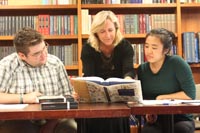Minors and Programs: Phronesis
Debating Conservatism and Progressivism
This fall, the Phronesis program has taken on the task of exploring the history and effect of conservatism
and progressivism in American politics. This ambitious task was spearheaded by Dr. Jeffrey Church, who launched the Conservatism and Progressivism in America lecture series. The goal
of this series, Professor Church said, is “to elevate political discourse by turning
to history and the basic principles of conservatism and liberalism. The lecture series
serves as a counterweight to the shouting matches all too often seen on television
and in contemporary politics.”
By inviting scholars and public intellectuals of the left and right to speak about the principles, history, and future of conservatism and progressivism, the series seeks to create a deeper understanding of the issues, while enriching modern political discourse and taking an intellectual, historical, and philosophical approach to our political debates. “All too often,” Professor Church said, “students either grow cynical and apathetic about politics, or else latch on to a certain political viewpoint that they understand. Both the extreme political apathy and dogmatism are symptoms of the same problem: our society doesn’t give the youth a political education. Given this, this lecture series demonstrates that there is a way for us to thoughtfully engage in politics.”
In early October, the program welcomed Dr. Thomas Spragens, a professor of political science at Duke University and author of Getting the Left Right: The Transformation, Decline, and Reformation of American Liberalism. Dr. Spragens lectured on “American Liberalism: Recent Problems and Future Challenges.” Later that month, Dr. Patrick Deneen, associate professor of government and the Markos and Eleni Tsakopoulos-Kounalakis Chair in Hellenic Studies at Georgetown University and author of Democratic Faith, lectured at Honors on “Different Sides of the Same Liberal Coin: The Consensus of ‘Conservatives’ and ‘Progressives.’”
The series has been popular across the academic community, each lecture bringing more than 100 attendees to the Commons. February’s visit from Dr. William Galston, the former deputy assistant for domestic policy to President Clinton, should provide an exciting capstone to the series.
Read excerpts from Phronesis students’ response to the visits.
Response to Thomas Spragens
Thomas A. Spragens’ lecture, which kicked off the lecture series on October 7, provided insights on the origins and evolution of progressivism in America, contrasting an older, ideal liberalism with today’s rights-based liberalism.
Emily Zinsitz, a political science major and Phronesis Fellow, found Spragens’ lecture engaging. Having read excerpts from Getting the Left Right through the Fellows program, Zinsitz said, “I have always had a nagging distrust in the ‘liberal’ insistence on correcting social ills though broad, equalizing programs, versus focusing on the citizens themselves. It was fascinating to encounter the idea that this is perhaps not true liberalism, but a distortion of it based on changing social and historical conceptions of the public.”
While political theory students are often asked to connect the theoretical with the practical, Bruce Hunt, a graduate student in political theory, explained that many political science departments “compartmentalize politics, political science, and political theory.” In laying out two different forms of liberalism and seriously engaging with these models, “Spragens’ lecture presented to us a model for how these things can be put together thoughtfully and responsibly.”
by Catrina Kim, piano performance and Phronesis junior
Response to Patrick Deneen
During Patrick Deneen’s short visit on October 25, he made a bold statement about his view on progress and diversity in America. He resolutely stated that because the idea of progress has become an ideology and a democratic faith, diversity is dwindling in America.
He explained his idea of progress by referring to John Dewey. As an active member in the progressive movement during the nineteenth century, Dewey believed in discovering knowledge and human progress. With Dewey’s commitment to discovery and progress laid out, Deneen brought in Alexis de Tocqueville as Dewey’s interlocutor. Contrasting Dewey, Tocqueville urged for a remembrance of the past through the embracing of aristocratic values rather than the present ideology of progress. Tocqueville believed that the idea of progress caused people to strive to perfect their current life without regard for the past or the future.
According to Deneen, the more pervasive the idea of progress becomes, the weaker the presence of the past and diversity becomes; and by diversity, Deneen means intellectual diversity, not ethnic diversity. Diversity has come to be equated with ethnic diversity and has itself become a kind of propaganda. When diversity is thoughtlessly accepted as good, there is a kind of piety involved that remains unexplained. For this reason, he said, there needs to be an intellectual diversity in order for people, and most importantly students, to be able to think for themselves.
Dr. Sue Collins, director of the Phronesis program, acknowledged the weight of Deneen’s view. She observed, “The purpose of higher education is to supply students the tools to think on their own.” However, Professor Collins also asserted, “Different ethnic groups and different genders do have different experiences—and higher education needs to be able to engage them.” Thus, while Professor Collins agrees with Deneen about the need to focus on intellectual diversity, she also believes that higher education should teach in a way that will bring everyone into the great conversation.
by Sydney Nguyen, political science and Phronesis senior
For more about the upcoming Galston lecture on Thursday, February 9, and the complete text of the response pieces, go to TheHonorsCollege.com/conservatismandprogressivism.

